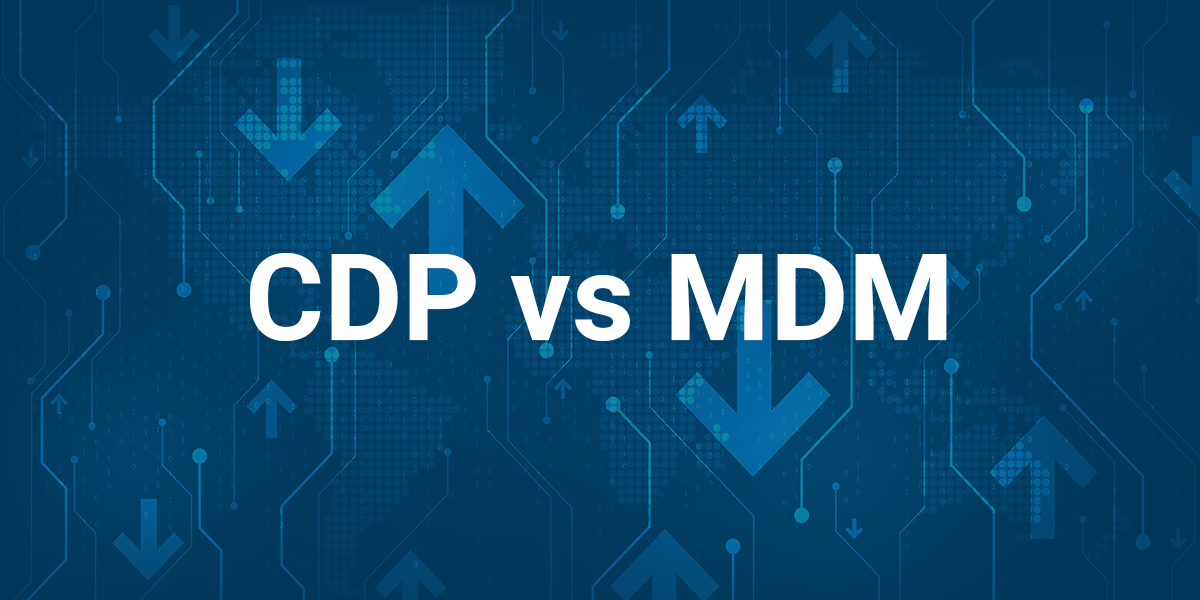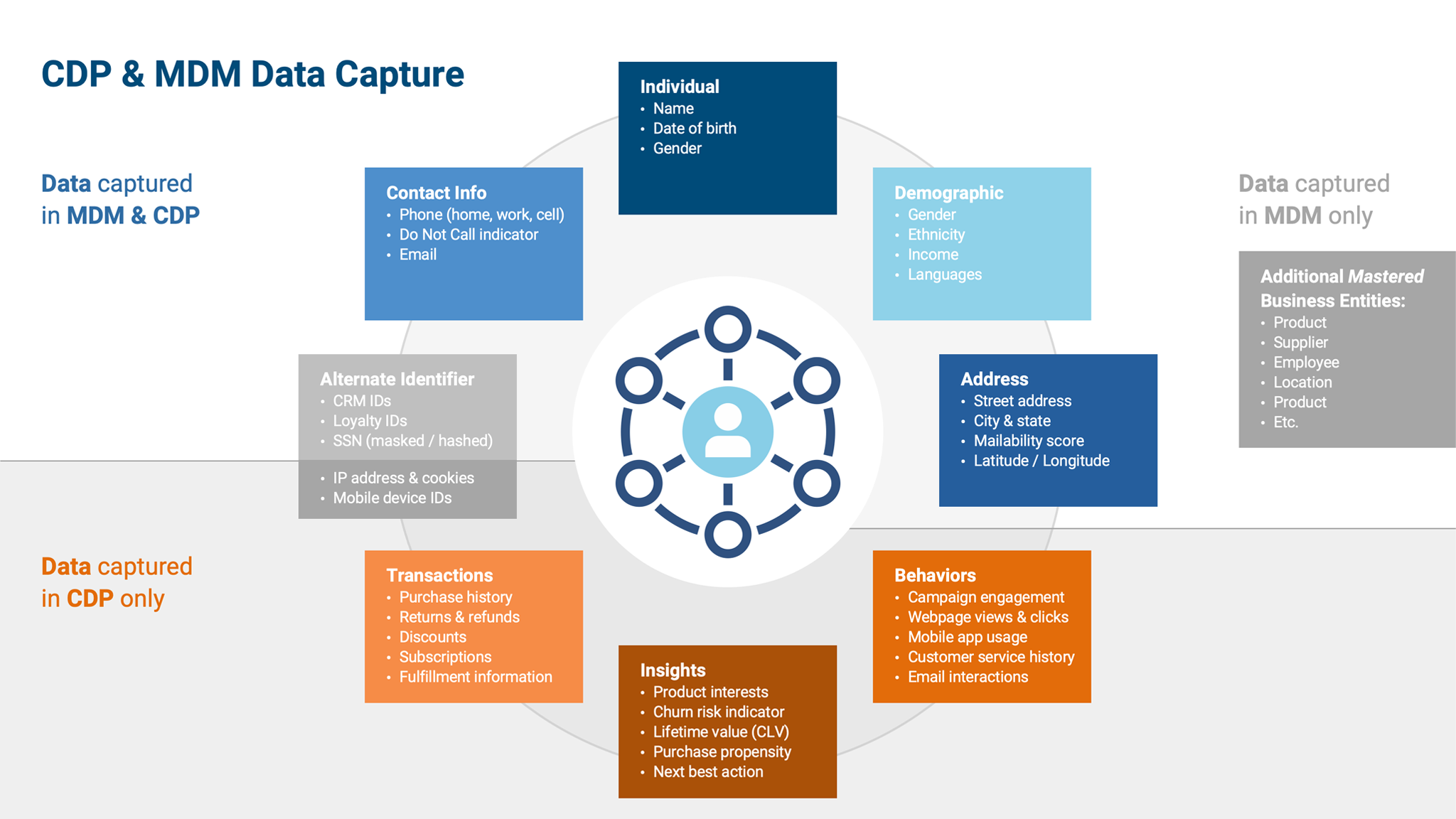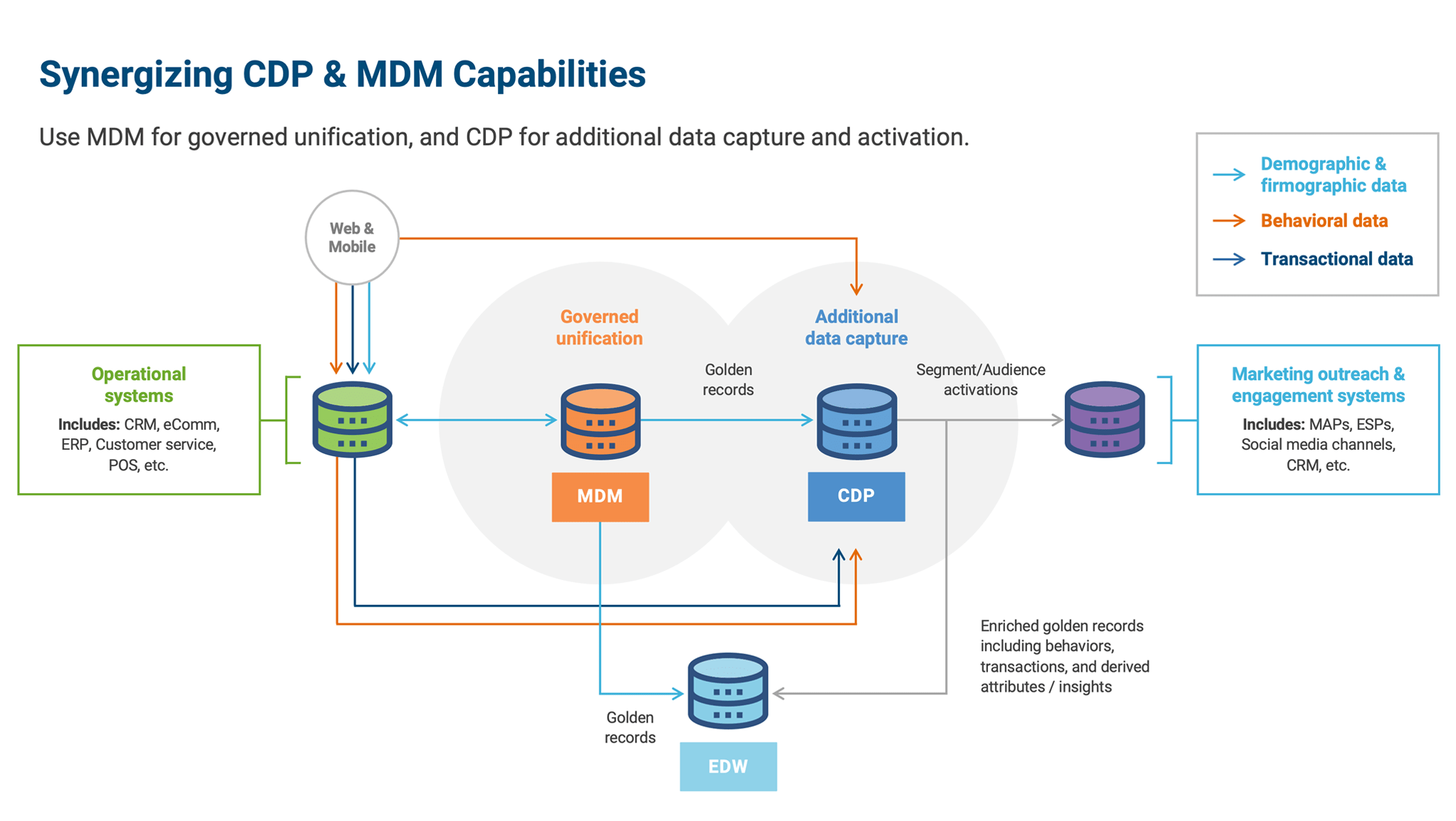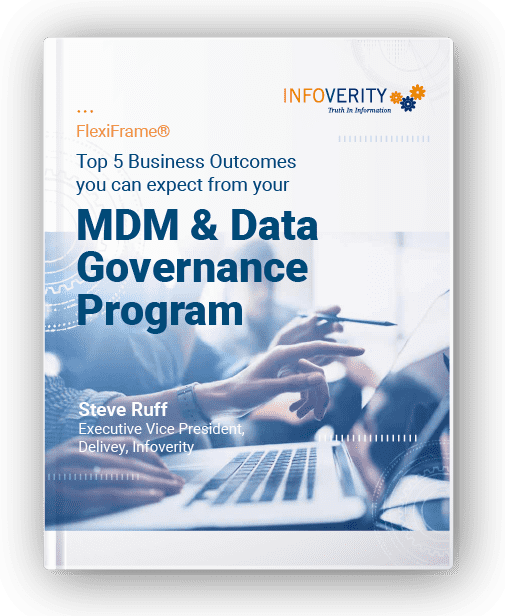In a rapidly changing technology landscape, lines between software solutions continue to blur and businesses have more choices than ever. Customer Data Platforms (CDPs) and Master Data Management (MDM) solutions are two frequently compared technologies that share enough similarities to garner confusion for many business decision makers.
Therefore, when evaluating CDP vs MDM systems, it is important to take a capabilities and outcome-centric approach to help guide decision makers on the best technologies to meet their goals.
CDP vs MDM: Table of Contents
What is a Customer Data Platform? Unleashing Data-Driven Marketing
CDPs create a consolidated view of customer information that can be leveraged by marketing. They are relatively new technologies that had only been officially classified as such in the last decade. As a result, CDP capabilities can differ significantly across software providers. However, most vendors lean into supporting the following features:
- Collection and unification of disparate data – both structured and unstructured
- Business user-ready UI for centralizing segmentation and audience creation
- Campaign orchestration and execution to activate your data across owned and paid engagement channels including SMS, email, mobile push, social media, paid advertising, and more
- Custom and out of box models to drive customer insights (predictive AI and machine learning)
- Real-time personalization across consumer website and mobile application usage
CDPs empower marketing and customer experience teams to personalize customer experiences and influence engagement and purchase behaviors.
Benefits of CDP solutions
- Facilitation of personalized and connected customer experiences
- Increased customer satisfaction, loyalty, and engagement
- Increased sales via cross-sell and up-sell opportunity identification
- Customer population growth and increased retention
- Improved marketing efficiency and effectiveness
- Optimization of marketing spend
- Decreased customer acquisition cost (CAC)
Ultimately, any company looking to enhance their marketing efforts and engagement would benefit from a CDP – including D2C / B2C and ABM / B2B business models.
Looking for CDP implementation guidance?
Infoverity can help your business with the entire CDP process: strategy, vendor selection, implementation, and support. To discover more on how we can help you achieve your marketing and customer experience objectives 
What is Master Data Management? A Foundation for Data Fidelity
Master Data Management (MDM) solutions aim to create an enterprise source of truth across multiple domains, or business entities, including customer, product, employee, location, supplier, and more. MDM solutions specifically capture “master” data, or the lean set of attributes that uniquely define a business entity, and typically enable the following capabilities:
- Identity resolution via exact (deterministic) and fuzzy (probabilistic) matching and merging of records
- Cross-system sharing and synchronization of operational and analytical systems
- Data cleansing and validation
- Quarantining of data that does not meet validation criteria & defined minimum requirements
- Data stewardship UI for managing golden records and correcting bad data
- Hierarchy management
- Identifying and storing relationships across domains (customer to product, product to supplier, employee to location, etc.)
MDM solutions are typically owned and managed by IT and Data Governance teams and are built to serve the entire enterprise by making a consumable source of truth available to various systems and business groups.
Benefits of MDM solutions
- Streamlining business operations
- Reporting accuracy improvements
- Prevention of duplicate record entry in upstream systems via search before create
- Supporting system consolidation and migration efforts (including CRM, ERP, and others)
- Identification of bad source system data and routing for upstream correction
- Creating a consumable enterprise source of truth for various business entities
CDP vs MDM – Highlighting Key Differences
MDM solutions sit behind the scenes driving operational improvements and increasing trust and accuracy in the information employees need to do their jobs effectively. Whereas CDPs directly support marketing teams by becoming a critical part of marketing operations and data-driven decision-making.
CDP and MDM both capture and consolidate customer information, and create a of truth for customer, so what makes them different?
CDPs emphasize an expanded view of customers via the onboarding of additional data sets. This typically includes transactions, behaviors, product interests, third-party insights, and any other context-relevant information captured across the enterprise. CDPs are designed with marketing end users in mind and streamline audience sharing across paid and owned engagement channels, rather than upstream operational systems. MDM contains the best source of truth across the enterprise but doesn’t include the depth of information contained in CDPs. In addition, MDM solutions don’t provide a marketing UI for segmentation, activation, customer journey automation, and other functionalities offered by CDPs.
MDM solutions emphasize accuracy and cleanliness across customer and other data domains and offer finer control over unification logic via out of the box exact and fuzzy matching, trust rankings, and manual match and merge capabilities. Golden records result in a persistent unique ID that allows for streamlined syndication of golden records to operational systems and enterprise ID management. Furthermore, CDPs also allow for data cleanup and unification but lack the level of control that MDM solutions offer and can be limited with what information can and should be shared to non-marketing operational systems.
To further compare CDP & MDM, the graphic below shows a generic Venn Diagram of the data typically captured and shared across the two systems.
Comparison of data captured in CDP vs MDM solutions
Amplifying CDP & MDM Benefits
Although CDP and MDM technologies solve different business problems, the value each solution brings complements one another and amplifies their impact on a business. In an ideal state, MDM consolidates and manages known customer identities, synchronizes golden records with operational systems, and maintains the best source of truth for demographic, firmographic, contact, and relationship information. The CDP then consumes golden records and captures additional known and anonymous data points such as campaign, web, and mobile engagement, order history, customer support interactions, product interests, and more. This comprehensive view of each customer rounds out the full customer journey – from the first touch when an unknown user visits a brand website, to the last touch point across channels, enabling marketing to centralize segmentation and optimize efforts across owned and paid engagement channels. Data science and marketing analytics teams can also benefit from the single view of customer captured in the CDP by leveraging machine learning and predictive AI to power customer insights.Reference architecture showing ideal CDP vs MDM integrations, along with interactions with other common enterprise systems
Conclusions
CDP & MDM solutions share many similarities but are built with different use cases and end users in mind. When done correctly, businesses can take advantage of their strengths to improve customer data management and marketing effectiveness. Infoverity recommends companies spend time aligning stakeholder groups upfront before investing in a CDP or MDM platform. Ultimately, decision-makers should choose the right technology based on business needs and use case priorities.




